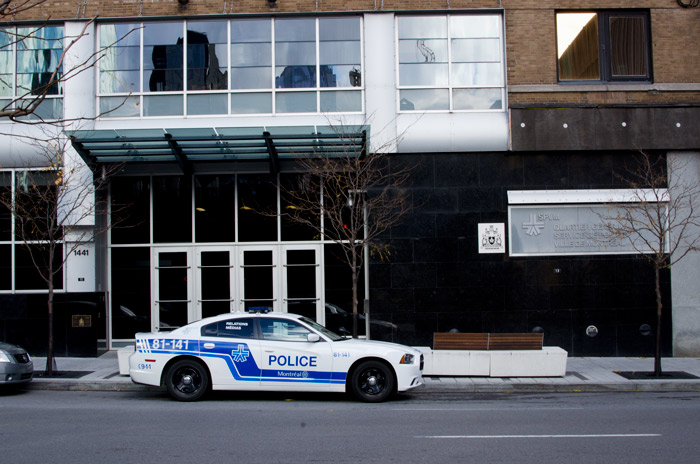Article 500.1 of Quebec’s Highway Safety Code, previously used to disperse and ticket protesters, has been repealed. Quebec Superior Justice Guy Cournoyer issued a ruling on Nov. 12, declaring the article unconstitutional. Quebec will have six months to amend the code.
The article in question
The Highway Safety Code is a provincial set of laws outlining legal procedure on Quebec’s highways. Article 500.1 prohibits vehicles or obstacles obstructing the highway unless previously authorized by the law.
“No person may […] place a vehicle or obstacle thereon so as to obstruct vehicular traffic,” Article 500.1 reads. “This section does not apply during parades or other popular events previously authorized.”
Cournoyer stated that the article was used to break up protests, violating the Quebec and Canadian Charters of Rights and Freedoms. He argued that the law was intended to prevent people from blocking roads with vehicles, not to discourage protests.
Article 500.1 was first used against demonstrations during the 15th annual anti-police brutality protest on March 15, 2011. Altogether, 239 people were arrested during the protest, with most charged under the Highway Safety Code and fined $500.
Usage of Article 500.1
Along with municipal bylaw P-6, which requires protesters to provide the police with an itinerary and prohibits the wearing of masks during protests, article 500.1 has been heavily criticized by protesters for infringing on individuals’ freedoms. Paul Ayotte, an organizer of the Confederation of National Trade Unions (CSN) demonstration that took place on Nov. 16 on McGill campus, is firmly against the use of article 500.1.
“I think it’s wrong,” Ayotte said. “Absolutely wrong. We have a right to free assembly and having to ask permission to have that right shouldn’t exist, we should just be able to have the right.”
Students’ Society of McGill University (SSMU) Vice-President (VP) External Emily Boytinck administrates all SSMU contingents of protests. She voiced similar concerns over the use of Article 500.1 to disband protests.
“I firmly believe that everyone has the right to take to the streets and demonstrate, and I’m grateful to see that one of the avenues used to ticket activists is no longer viable,” Boytinck said.
Protesters charged with a P-6 violation are fined $637, while an Article 500.1 violation costs $500. Boytinck expressed sympathy for students faced with these potential expenses, and felt that the existence of such fees, in addition to students’ generally unstable finances, discourages them from demonstrating.
“I believe that these laws have created a culture of fear for student activists,” Boytinck said. “Add the risk of getting ticketed to the risks that you will be exposed to tear gas or even pepper spray, and the likelihood that people will feel safe and comfortable going to a demonstration will be decreased.”
Ayotte and his colleagues were against the article because of what it represents.
“I think notifying the police isn’t a problem, but you shouldn’t have to ask them permission for anything,” Ayotte said. “They shouldn’t have the right to refuse, and if they didn’t have the right to refuse, why even ask in the first place.”
Implications of the Ruling
Boytinck hopes that this ruling will inspire a similar rejection of P-6.
“The SSMU has previously condemned this bylaw by writing an open letter to the city of Montreal and encouraging our membership to go to demonstrations against P-6,” Boytinck said.
The Montreal Police Service (SPVM) declined to comment. It is currently unknown how those with 500.1 tickets will be absolved, or whether those previously ticketed will be compensated.










“No person may […] place a vehicle or obstacle thereon so as to obstruct
vehicular traffic,” Article 500.1 reads. “This section does not apply
during parades or other popular events previously authorized.”
Your use of the English version of the third paragraph is ironic… ironic because I doubt that Judge Cournoyer has ever even seen it. The entire theory that says this is a demonstration permit regime rests on that third paragraph. No government would ever describe demonstrations as “popular events” yet that’s what it says in the English version!
The French version says “défilés et autres manifestations” which, Article 7 of the charte de la langue française and the manner in which this affects interpretation of statutes, means the Jazz Festival, the juste pour rire, etc… but that presupposes again that they are presented the English version! Otherwise, they’d think they meant street demos.
Oh and Judge Cournoyer did not say it only applies to lorry drivers, he said it was a demonstration permit regime (false) but that the mechanism for making it work was broken, and thus, with no way to get a permit, it is unconstitutional…